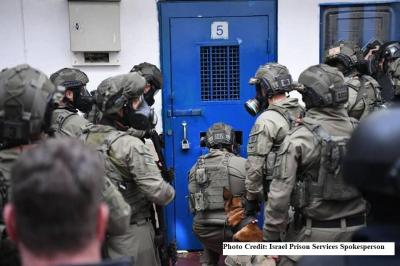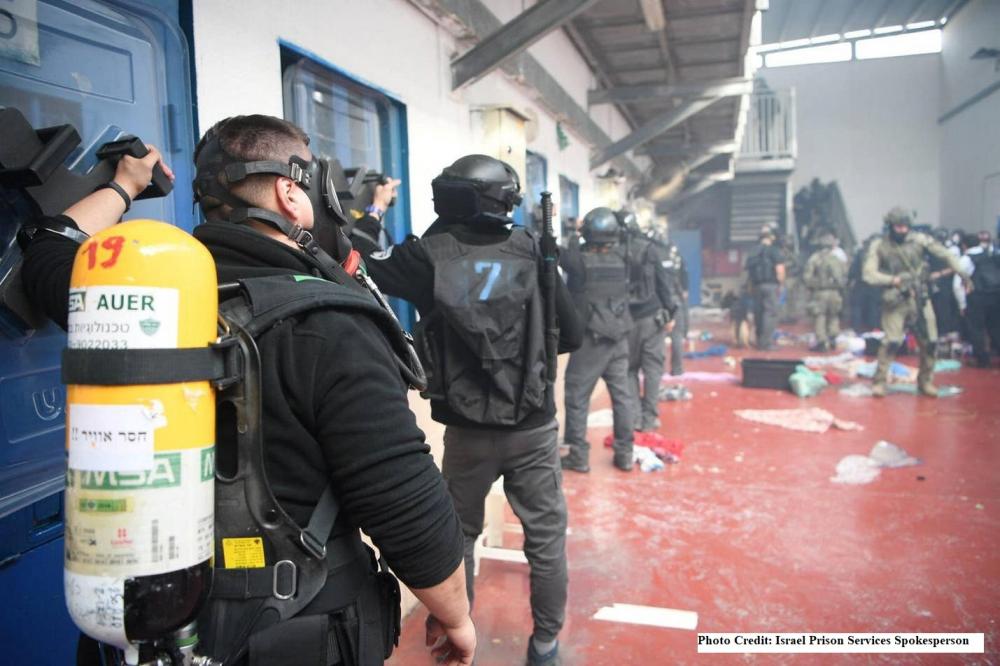
For over 29 years, Addameer Prisoner Support and Human Rights Association has documented the systematic use of torture by the Israeli occupation regime against Palestinian prisoners and detainees in Israeli prisons and interrogation centers. Despite the absolute prohibition on torture under international law, Israeli Occupation Forces routinely employ physical and psychological torture, along with degrading and inhumane treatment, against Palestinian detainees. Such practices begin with the violent arrest of Palestinian detainees, who are often brutalized and beaten, and escalate during interrogation[1] when detainees are subjected to various forms of torture, including physical assaults, beatings, positional torture, and psychological torture. Torture and ill-treatment persist, beyond interrogation, as a staple condition throughout Palestinian prisoners’ incarceration in Israeli prisons and detention centers.
To mark the International Day in Support of Victims of Torture, in light of the recent raid in Ofer Prison and the closing of investigations in the previous Naqab raid, Addameer seeks to highlight an underexamined, yet blatant case of torture and ill-treatment against Palestinian prisoners’: Israeli violent raids on Palestinian prisoners held in Israeli prisons. Prison raids by Israeli Occupation Forces special units, extremely violent in nature, give way to a host of abuses and human rights violations and serve as one method of collective punishment, torture, and ill-treatment of Palestinian prisoners and detainees.
Israel systematically exploits any excuse to deploy its special forces into prisons to attack and harass the Palestinian prisoners and detainees. Addameer alone documented more than 25 attacks in the Israeli prisons throughout 2020. During these attacks, the special forces shackle the prisoners, often physically assaulting them without any regard to their medical conditions and using tear gas and pepper spray, along with a plethora of other tactics to further abuse them. More often than not, the prisoners report sustaining grave injuries due to the brutality of the attacks. Additionally, the Israeli forces often confiscate the prisoners’ belongings, as well as all electronics and appliances in the prison rooms afterward.
Recent Israeli Occupation Forces’ Raid on Ofer Prison, Parallels to the 2019 Raid on Naqab Prison
On 13 June 2021, the Drur and Alyimaz Units of the Israeli Occupation Forces violently raided prisoners’ cells in Section 12 in Ofer prison, forcibly searching, ransacking, and destroying electronics, as well as confiscating all prisoners’ written material. Addameer’s lawyers confirmed that the IOF raid conducted extensive searches in Section 12, forcibly transferring 72 prisoners from Section 12 to Section 18 of Ofer prison as the prison remained under lockdown.
The latest forced incursion comes in light of the re-emergence and wide dissemination of a security camera video filming the violent IOF raid of Palestinian prisoners in Naqab Prison in March 2019. The event, one of the most violent raids documented in recent years, depicted dozens of Israeli prison officers harassing and assaulting prisoners, kicking prisoners, and beating them with batons as they laid handcuffed for hours. An affidavit from a Palestinian prisoner witness and victim to the attack, collected by Addameer,[2] documented the events of the crackdown which included the firing of rubber-coated metal bullets, pepper spray, physical assault—including kicking and beatings by baton—use of attack dogs, positional torture, medical neglect, and ill-treatment.

Of the approximately 98 prisoners in the targeted prison section, 82 suffered head injuries, dozens suffered from severe injuries, of which about 11 were sent to the prison clinic, and one prisoner sustained grave injuries leading to a two-day coma and his near-death.[3] Other serious injuries included severe bruising, broken bones, and deep cuts. Due to the severity of their conditions, twelve prisoners were transferred to the hospital by ambulance or a medical helicopter. The remaining injured prisoners were left for hours handcuffed, subject to retaliatory ill-treatment and inhumane living conditions for days and weeks following the raid.
The events of the IOF raid on Palestinian prisoners in Naqab Prison, beyond constituting flagrant evidence of physical and psychological torture, serve as a form of collective punishment and one method of torture and ill-treatment against Palestinian prisoners and detainees. The incident stretched out over hours, is extended in longevity by the days and weeks of subsequent retaliatory ill-treatment, deliberate medical neglect, inhumane living conditions, and punishment.
“One-handed or not, the cuffs go on”: Zamel Shlouf Recounts Details of the Attack in Eshel Prison
In another such case in 2020, Addameer documented Israeli occupation forces’ raid on Eshel prison. At six in the morning on 12 October 2020, a Massada special forces unit raided Eshel prison. Prisoner Zamel Shlouf, 41 years old from Gaza, recounts the details of the attack to Addameer’s lawyer, “The prisoners were asleep but I heard other prisoners yelling “Massada”; I immediately stood up. That’s when I saw a Massada unit member raising his weapon at me from the window in the cell door; he ordered me to get down on the ground and put my hands on my head. When the unit opened the cell door, one soldier yanked on my clothes, grabbing me by the nape and asked me why I was there. I told him that he asked me to lay on the ground in that position. That’s when the soldier started to kick me in the right side of my pelvis; it was extremely painful and humiliating.”
|
“When the Israeli special forces enter the prisons, their primary goal is a show of force to provoke the prisoners and deliver a message that neither the prisoner nor the prisoners’ movement has the right to an ounce of dignity in the face of the occupation.” Na’el Barghouthi- Eshel Prison |
Zamel recalls, “The Massada unit did not take into consideration the conditions of the ill prisoners in the section. The soldiers handcuffed everyone, even prisoner Jamal Abu Al-Haija’ who is missing an arm; they opted to handcuff him to me instead of exempting him considering his medical condition.”
A Brutal Assault almost Cost a Palestinian Life
On 13 July 2020, a large number of the Yamas, Massada, and Drur special forces units raided Ofer prison and attacked Palestinian prisoners in three sections. Addammer documented the attack through a field interview with released prisoner Nader Al-Qaisi, 24 years old from Bethlehem, who was held there at the time. Al-Qaisi stated that on that day, Israeli special forces raided the prison and took prisoner Rami Fadayel from his room without prior notice, resulting in an altercation between the prisoners and the prison administration. Later that day, at exactly 8 pm, sirens sounded in the prison; the prisoners knew that the administration was preparing to raid the sections. It became apparent that special forces units were gathering in preparation to raid sections 16, 21, and 22.
Al-Qaisi recalls, “it was then when we started shouting and banging on the doors to let the other sections know that we were about to be in a lot of trouble. Mere minutes later, the special forces raided the section; there were more than 50 masked soldiers dressed in tactical gear with protective equipment, accompanied by military dogs. The units closed all the windows in every room, along with the door slot used to bring in food. We immediately knew that they were going to launch gas.” Al-Qiais recounts the painful details of that day, “Despite everything we did, the soldiers tried to push through the mattresses using long batons. When they failed to dislodge the mattresses, they launched a large canister of gas (known among the prisoners as “the poisonous powder gas”) into the room from beneath them. Once it was clear that we were worn out, they emptied another canister; half an hour later, they launched a third one. We started screaming then because we thought prisoner Ali Jaradat, 65 years old from Ramallah, died as he had lost consciousness from inhaling all that gas. This attack was different. Normally, when the special forces raid the rooms and gas us, they would disperse oxygen minutes later in fear of a prisoner dying from gas inhalation. This time they didn’t care and never circulated oxygen.”
|
“Even though I have been arrested 11 times, this attack by the special forces in Ofer prison was different. It was the most violent and brutal attack I have ever witnessed.” Ibraheem Msaffar - Ofer Prison |
He continues, “After that, we went into the bathroom to take cover from the gas. That’s when 4 soldiers entered the room and dragged prisoner Ali Jaradat to the prison clinic. Immediately after that, they pushed us to the ground; a soldier stood next to each prisoner, placing their foot on our backs. The soldier next to me pushed his knee into my back while I was face-down on the floor.” Al-Qaisi adds that during the raid, the special units had confiscated all the appliances and food utensils and tableware, and kept all the prisoners bound until the following morning; we were uncuffed at 6 in the morning.
Culture of Impunity, Complicity of the Military Judicial System
The recurrent use of prison raids as a form of punishment and ill-treatment by Israeli occupation forces against Palestinian prisoners and detainees is largely obscured due to suppression of evidence, beyond witness testimony, and their characterization as “security measures.” Nevertheless, even in obscene cases as the 2019 Naqab raid, described by a senior Israel Prison Service official as “one of the most violent events”[4] to take place in an Israeli prison, with wide documentation by human rights groups and security camera evidence, no individual, system, or policy has been taken to count. Rather than a point of exceptionality, this case belies the culture of impunity enjoyed by the Israeli occupation and apartheid regime as it systematically subjects Palestinian detainees to numerous violations of their basic rights under international law. The systemic practice of torture and ill-treatment constitutes grave violations of the Fourth Geneva Conventions and its additional protocol of 1977, as well as the Rome Statute of the International Criminal Court.
The Israeli military judicial system is integral in perpetuating impunity for torture by providing legal and judicial cover for all acts of torture. International judicial precedents concur that guarantees of a fair and public trial include the courts' independence and impartiality, which require the judicial system to not depend on the discretion of any branch of the government, especially the executive branch. Israeli military courts display a significant dependency on the discretion of the Israeli government and intelligence agencies, which has effectively transformed the judicial system into a tool of the occupation to legalize Israeli violations of Palestinian human rights.
To this end, on the International Day in Support of Victims of Torture, Addameer Prisoner Support and Human Rights Association calls for:
- The International Criminal Court Office of the Prosecutor to initiate investigations into the Situation of Palestine for crimes against humanity and war crimes committed, taking into account the multitude of forms of torture and ill-treatment systematically perpetrated against Palestinian prisoners and detainees;
- The United Nations Committee against Torture to pressure Israel to adopt adequate criminal legislation to define and penalize torture under Israeli laws;
- The third States, including High Contracting Parties to the Fourth Geneva Convention, to take concrete measures to pressure Israel to halt its violations of international humanitarian and human rights law and to ensure an international investigation into all complaints of torture by Israeli Occupation Forces, followed by effective accountability for those responsible and redress for victims.
END
[1] Addameer Prisoner Support and Human Rights Association, “I’ve Been There: A Study of Torture and Inhumane Treatment in Al-Moscobiyeh Interrogation Center,” March 2018. https://www.addameer.org/sites/default/files/publications/al_moscabiyeh_report_0.pdf
[2] Addameer Prisoner Support and Human Rights Association, “Annual Violations Report 2019,” January 2021. https://www.addameer.org/sites/default/files/publications/v2020_online.pdf
[3] Ibid.
[4] Breiner Josh, “Israeli Officers Were Filmed Beating Palestinian Inmates. No One Arrested, Case Closed,” Haaretz, 12 June 2021. https://www.haaretz.com/israel-news/.premium-israel-closes-case-against-prison-officers-who-were-filmed-beating-inmates-1.9895789